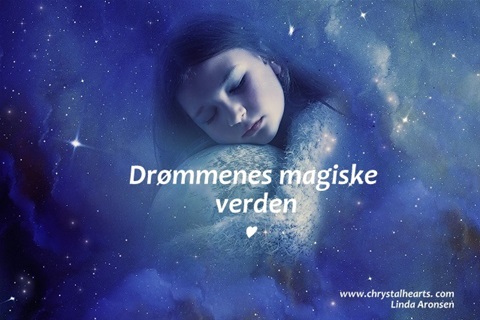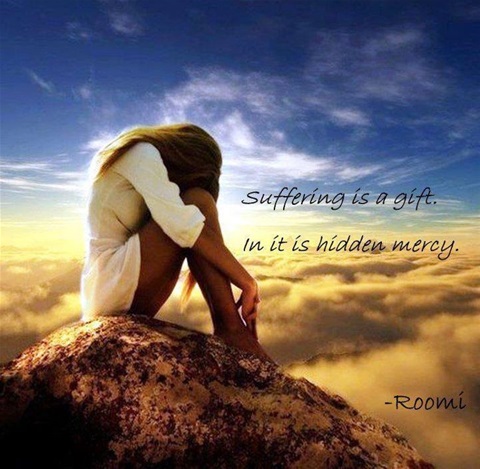Drømmer - i et universelt perspektiv
Etter å ha tolket drømmer siden slutten av nitti tallet, er det spesielt et moment som ser ut for å forvirre mange som drømmer mye. Mange tar drømmene sine
bokstavelig, og ser ikke at de vi drømmer om kun er symboler - til oss selv. Alle vi drømmer om er som et skuespill som utspiller seg, kun for å vise egenskaper/kvaliteter, både positive og negative - til oss selv.
Et annet viktig moment i drømmer for mange i denne tiden, er at drømmer åpner opp for det som har ligget i dvale, vært ubevisst, glemt eller fortrengt. Da alt vi har vært, tenkt, følt, blitt påvirket av osv. bærer
vi i vår egen kropp og psyke.
Her kan du sjekke hva din drøm betyr:
Forklaring på de 11 typiske drømmer: (husk å
trykk på bildene på denne nettsiden)
Drømmetydning
Forklaring på å drømme
disse dyrene:
Drømmetydning
Drømmetydning
Eksempel på en drøm som sees i et universelt eller høyere perspektiv:
En ung kvinne har hatt en gjentagende drøm og har drømt samme drømmen i mange år. Hun er i et rom med mange lamper som ikke lyser. Hun prøver å tenne lampene, en etter en, men det nytter bare ikke. Hun føler seg desperat, og prøver igjen, men uten resultat.
Tolkning:
Slik det er, sett fra en høyere dimensjon, eksisterer det to type lys. Det falske og det ekte.
Det ene lyset er vårt eget «ekte hjertelys». Det andre er det falske ytre lyset. Slik jeg tolker denne drømmen, prøver dennen kvinnen å tenne sitt eget hjertelys, men leter utenfor seg selv. Og uansett hvor mange lamper hun prøver å tenne, det lar seg bare ikke gjøre! Og, derfor kommer drømmen stadig i repeat.
Drømmen indikerer en oppvåkning. Og når
denne kvinnen erkjenner dette, oppstår et (mer eller mindre) bevissthetsskifte. Og, ganske sannsynlig kan hun få denne bekreftelsen i de videre drømmene. I så tilfelle endrer drømmene seg.
Et annet moment er at dersom
vi ikke er fokusert på vår egen selvutvikling, eller jobber med oss selv på noen måte, er drømmer ofte den «eneste» indikatoren som kroppsbevissthetene, oss som menneske og sjel, kan nå oss på. Jeg opplever
at dette er årsaken til at mange i denne tiden, drømmer mye. For, det som ikke er brakt opp i bevissthet, kommer ofte til oss i drømme.
Hvorfor vonde drømmer er bra
Why Bad Dreams Are Good
Dreams are the ultimate mystery—they can’t be weighed or measured. What are dreams telling us? we ask ourselves
from the time we’re children. What do they mean?
Especially, we question the bad dreams.
What’s behind the nightmares, the anger dreams, the frustration dreams, the stress dreams, the sweat dreams, the wake-in-the-night-screaming dreams?
How can we make them go away? Are they punishment? Can’t we have some more blissed-out dreams of tropical island vacations instead?
Once you understand what’s behind those bad dreams, you won’t want them to go anywhere.
“Bad” dreams are the soul’s way of healing. When we’re awake, we’re not supposed to be breaking down the walls of our emotional hurt.
When we are wounded, a physical component in the brain puts up a barrier to prevent us from constantly processing and reprocessing the pain, so that we can be productive and move forward during our waking hours.
They’re not walls of denial; they’re walls of divine protection. While some conscious processing is healthy and necessary, it’s not meant to haunt us.
The time to process that pain is in our sleep. When we’re not conscious, the emotional walls come down so the soul can do its cleanup and repair work.
This means that all sorts of difficult emotions get stirred up, and they work themselves out through our dreams. If this didn’t happen, frustration, anger, fear, betrayal, guilt, and humiliation would build up and up and up within us until they overpowered the strength of the walls holding them in place and took over our waking lives.
Instead, our dreams release them. This nightly housecleaning—aided by the Angel of Sleep, the Angel of Dreams, and the Unknown Angels—helps
us face what’s going on in life without becoming scarred by it.
Sometimes dreams have staying power. A dream can stick to you all day or even longer—even years. These dreams can
be confusing. We often dream of family and other loved ones, for example, with a swirl of emotions.
Even if everything is going fine in a waking relationship, a dream can bring a feeling of hurt or uneasiness. Or if it’s a relationship where’s there’s been some challenge or distance, dreams can bring up the old wounds, making us contemplate what went wrong years ago to cause the pain.
We may wake from a dream feeling like we did something wrong, or like we weren’t heard or perceived right. As we painfully try to decode what it all means, we can be left feeling empty.
All of this is healthy. I’ve heard from people who told me that a bad dream made them pick up the phone and call a family member or friend they hadn’t talked to in years, starting a process of great healing.
Any empty feeling is because toxic wounds and emotions left us (or started to leave us) in our sleep, reducing our storage bank of hurt. Even though we think it’s the opposite, bad dreams rejuvenate us. They remind us that there are people, places, and things in our lives that may need some attention so we can move on.
Bad dreams don’t close doors; they open doors. They create new beginnings. Even if
you’re not aware of what that new beginning is, it’s happening.
Far down the road, you may have the perspective to see what opportunity a bad dream led to in your life. We wish
each other “sweet dreams,” when really, we should wish each other “healing dreams.”
To advance the soul, mend the heart, and empty yourself of harmful emotions, you don’t want every dream to be perfect and tranquil and flowery. You don’t want your dream life to be an all-out wonderland.
You want your dreams to have some hardship in them, because you want the
good stuff to be happening when you’re awake. If our dream lives were total fantasy, sleeping would be the only thing we’d want to do.
Now, there are sinister people in the world.
They have existed throughout history. These coldhearted people can go through life without one nightmare. That’s an indication of how cut off they are from processing negative experiences like pain and suffering.
Since they don’t deal with their pain while they sleep, they hold on to it in their waking lives, and they want to inflict it on others.
On the flip side, you can
have the most compassionate, generous, loving person who can’t go a night without dreaming something unpleasant. Believe it or not, this is the healthier process. Because this person is so tuned in, she’s a witness to others’ struggles.
She experiences the range of human suffering, and so when she checks out for the night, her brain needs to protect her from becoming haunted by it in her waking life.
She may dream of school-yard bullies and natural disasters and war zones, and it’s all for her benefit—so that rather than waking up bitter that she has to leave some fantastical dream and face a harsh world instead, she
can wake up relieved to leave those tough dreams behind, and ready to continue her sacred work of compassion.
Let me be clear that having good dreams does not make you a bad person. Of course
not. It’s all about balance. In addition to those memorable “bad” dreams, we’re meant to have beautiful dreams, as well.
The angels sometimes grant us dreams of transcendence and hope. Sometimes our dreams are premonitions or messages or creative inspiration.
Some nights, we have mild bad dreams in which we process emotions, though we’re spared from remembering
what happened come morning. Other times, we get to visit with a deceased loved one in our dreams.
Just remember to welcome, too, the dreams that challenge you—they are doing you a great
service as your body heals during slumber. They are not a punishment or judgment. They are helping you become your best self.
Excerpt from Medical Medium Thyroid Healing: The Truth behind Hashimoto’s, Graves’, Insomnia, Hypothyroidism, Thyroid Nodules & Epstein-Barr. Copyright © 2017 by Anthony William. Published by Hay House; November 7, 2017.
You can order your copy of Thyroid Healing here
Kildehenvisning: (åpnes i nytt vindu)


